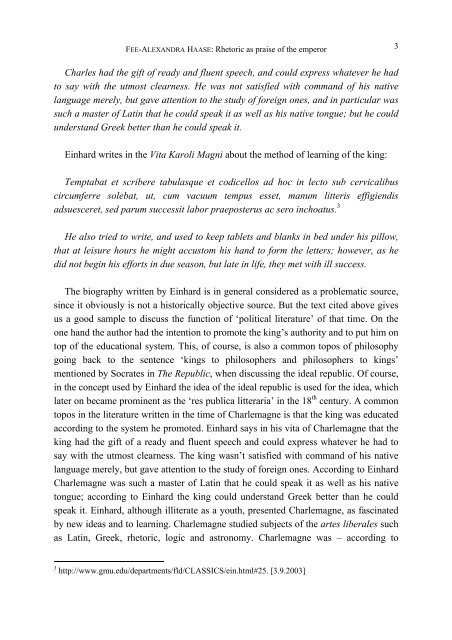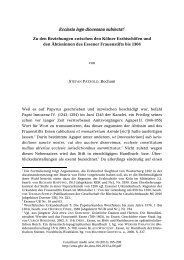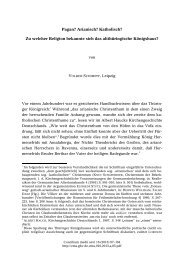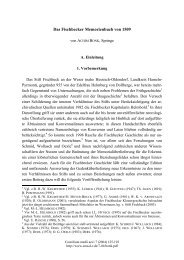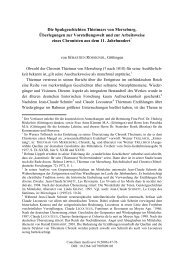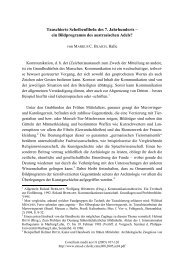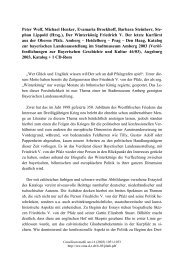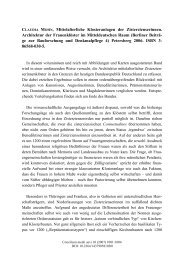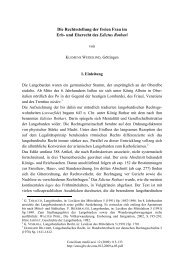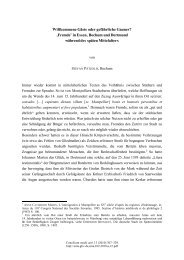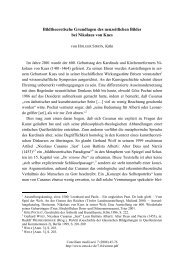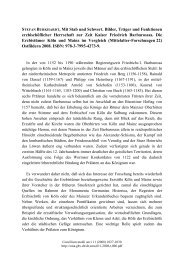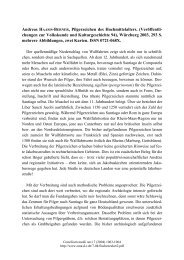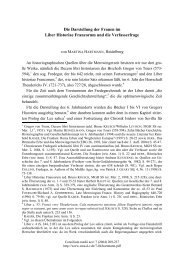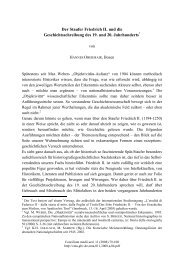Rabanus Maurus - Concilium medii aevi
Rabanus Maurus - Concilium medii aevi
Rabanus Maurus - Concilium medii aevi
You also want an ePaper? Increase the reach of your titles
YUMPU automatically turns print PDFs into web optimized ePapers that Google loves.
FEE-ALEXANDRA HAASE: Rhetoric as praise of the emperor<br />
Charles had the gift of ready and fluent speech, and could express whatever he had<br />
to say with the utmost clearness. He was not satisfied with command of his native<br />
language merely, but gave attention to the study of foreign ones, and in particular was<br />
such a master of Latin that he could speak it as well as his native tongue; but he could<br />
understand Greek better than he could speak it.<br />
Einhard writes in the Vita Karoli Magni about the method of learning of the king:<br />
Temptabat et scribere tabulasque et codicellos ad hoc in lecto sub cervicalibus<br />
circumferre solebat, ut, cum vacuum tempus esset, manum litteris effigiendis<br />
adsuesceret, sed parum successit labor praeposterus ac sero inchoatus. 3<br />
He also tried to write, and used to keep tablets and blanks in bed under his pillow,<br />
that at leisure hours he might accustom his hand to form the letters; however, as he<br />
did not begin his efforts in due season, but late in life, they met with ill success.<br />
The biography written by Einhard is in general considered as a problematic source,<br />
since it obviously is not a historically objective source. But the text cited above gives<br />
us a good sample to discuss the function of ‘political literature’ of that time. On the<br />
one hand the author had the intention to promote the king’s authority and to put him on<br />
top of the educational system. This, of course, is also a common topos of philosophy<br />
going back to the sentence ‘kings to philosophers and philosophers to kings’<br />
mentioned by Socrates in The Republic, when discussing the ideal republic. Of course,<br />
in the concept used by Einhard the idea of the ideal republic is used for the idea, which<br />
later on became prominent as the ‘res publica litteraria’ in the 18 th century. A common<br />
topos in the literature written in the time of Charlemagne is that the king was educated<br />
according to the system he promoted. Einhard says in his vita of Charlemagne that the<br />
king had the gift of a ready and fluent speech and could express whatever he had to<br />
say with the utmost clearness. The king wasn’t satisfied with command of his native<br />
language merely, but gave attention to the study of foreign ones. According to Einhard<br />
Charlemagne was such a master of Latin that he could speak it as well as his native<br />
tongue; according to Einhard the king could understand Greek better than he could<br />
speak it. Einhard, although illiterate as a youth, presented Charlemagne, as fascinated<br />
by new ideas and to learning. Charlemagne studied subjects of the artes liberales such<br />
as Latin, Greek, rhetoric, logic and astronomy. Charlemagne was – according to<br />
3 http://www.gmu.edu/departments/fld/CLASSICS/ein.html#25. [3.9.2003]<br />
3


